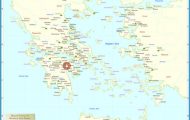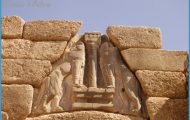Haides, Zeus and Poseidon, the mighty triad, ruled creation. In the Iliad, Poseidon outlines the arrangement: We are three brothers, born of Cronus and Rhea – Zeus, myself, and Haides, who rules beneath the earth. So all [creation] is divided into three, and each of us has been apportioned his own area. When the lots were shaken, I won dominion over the grey sea, Haides the misty subterranean gloom, and Zeus the broad heavens in the upper air and clouds. But the earth and high Olympus are shared between us all.
Haides & Persephone Photo Gallery
Haides name was considered so unlucky that by the fifth century bc people commonly refered to him as Plouton, perhaps because of the rich minerals which, like his kingdom, lay beneath the earth.
Haides court included other deities. Chief was his wife, Persephone, who lived with him for only four months out of twelve. Lonely, Haides amused himself with Minthe, but Persephone found out. She trampled her rival underfoot. Poor Minthe was transformed into a herb and a mountain near Pylos was named after her, with a sanctuary to Haides on its slopes. Another paramour was luckier. Leuce died a peaceful death and was changed into a white poplar.
From earliest times, Haides lieutenant was Thanatos, the twin brother of Hypnos, described by Hesiod as having: ‘An iron heart and a spirit as pitiless as bronze. He possesses whatever mortal he takes hold of and is hateful even to the gods.’
Hateful Thanatos may have been, but both he and Haides were considered to be as central to human experience as any other god: neither virtuous nor wicked, just inevitable. Only mortals were good or bad. Classical Greeks believed that in the Underworld each soul was judged to decide its fate and that the dead were punished or rewarded for their behaviour while alive. Plato’s Socrates playfully describes Zeus explaining:
I have appointed my own sons as judges: two, Minos and Rhadamanthus, are from Asia; one, Aeacus, is from Europe. When they are dead, they will sit in judgment in the field beside the crossroads. From here one road leads to the Islands of the Blessed, the other to Tartarus. Rhadamanthus shall judge the Asiatics, Aeacus the Europeans, with Minos as final arbiter, if the others have doubts.
When Plato wrote this in the fourth century bc, an ‘official geography of Hades was evolving – but it was very different from Homer’s vision.









